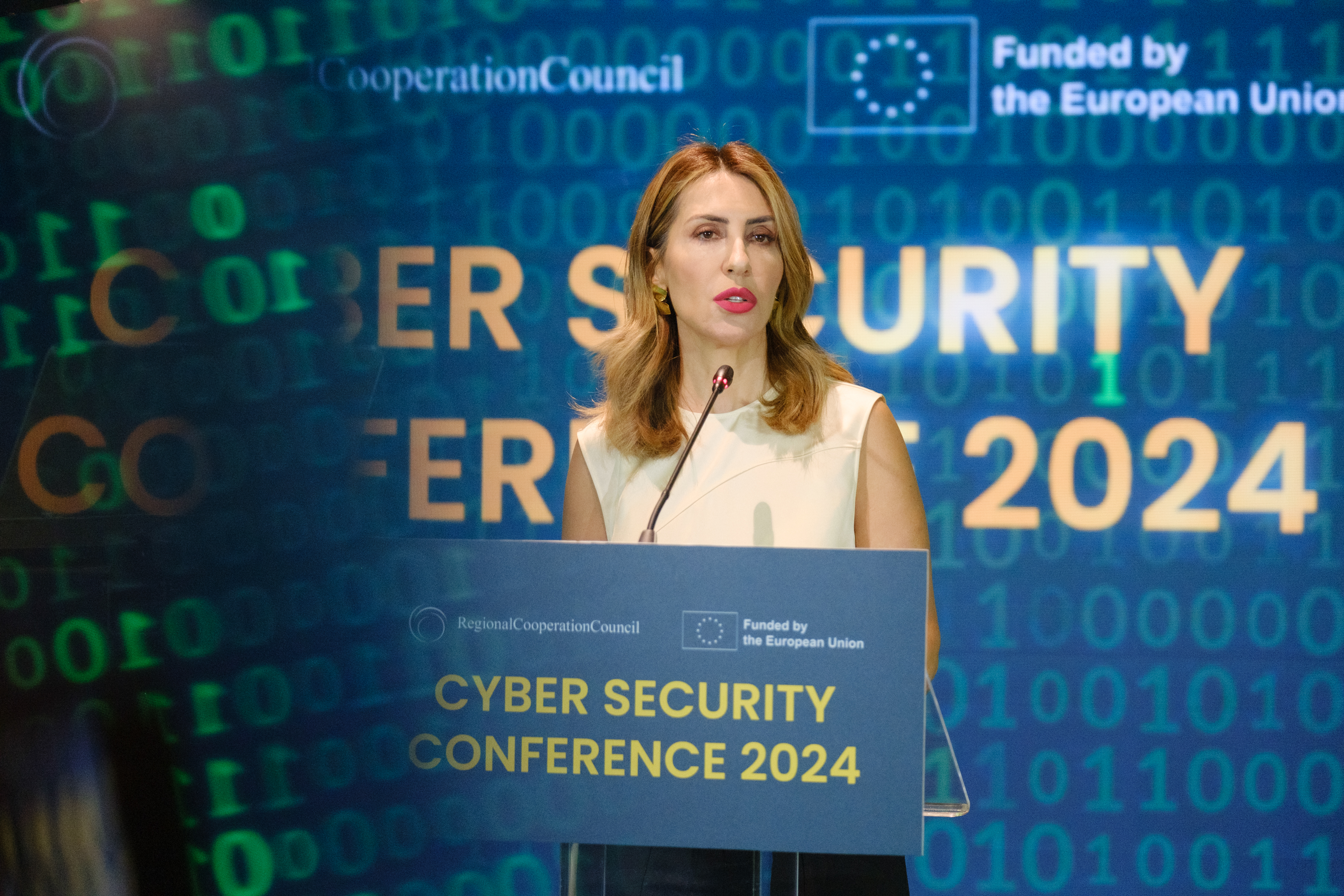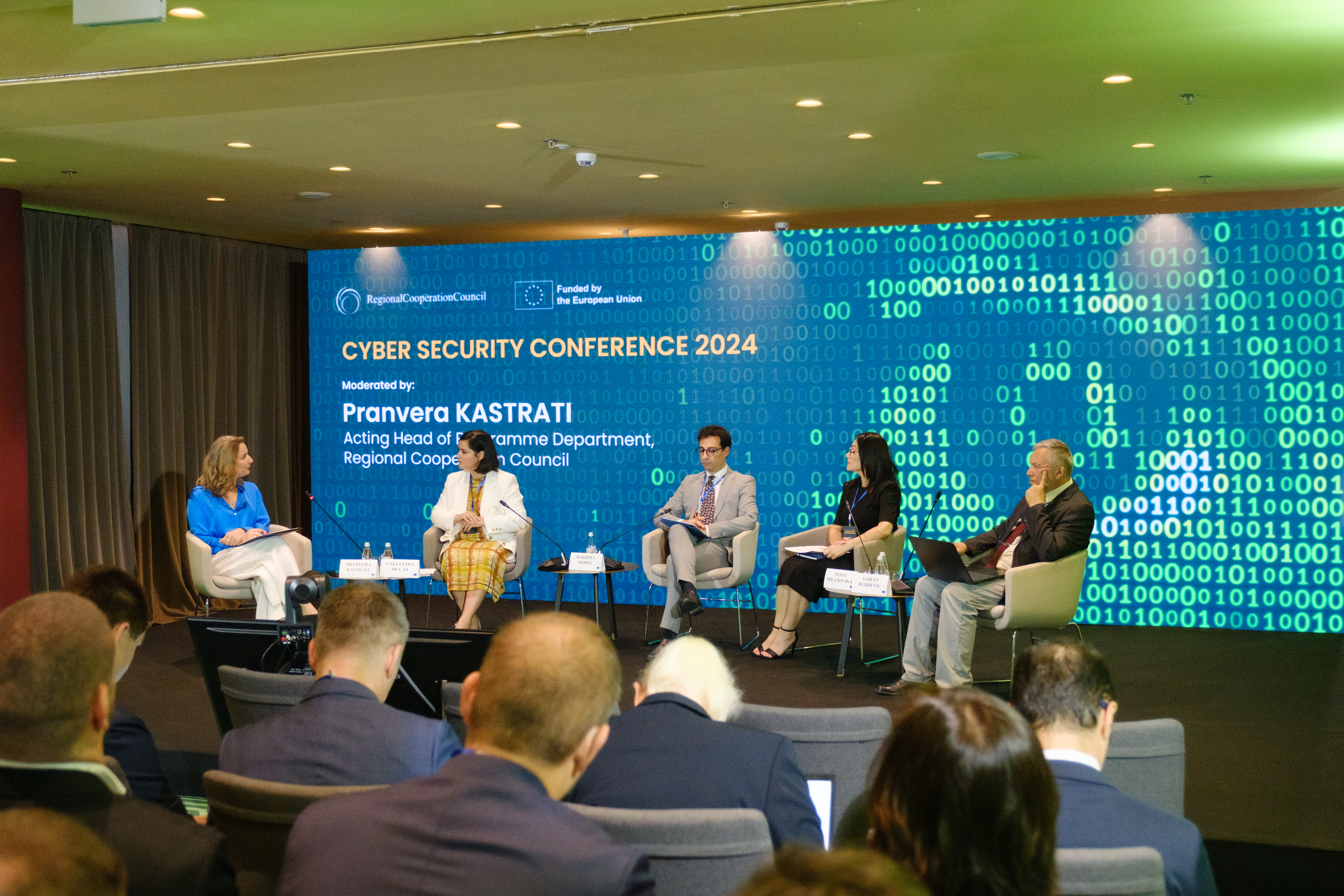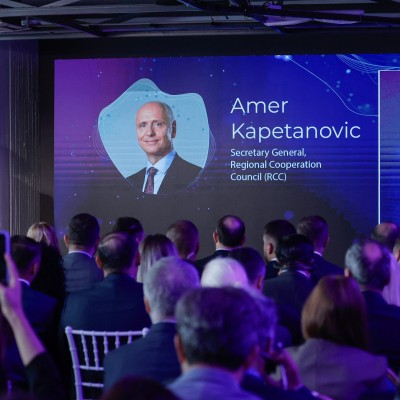Bregu: All-inclusiveness is paramount in implementing cybersecurity measures across the Western Balkans
09 July 2024

RCC Secretary General Majlinda Bregu opening the second High-Level Conference on “Cybersecurity Challenges and Opportunities in the Western Balkans” in Tirana on 9 July 2024 (Photo: Armand Habazaj)

High-level panel: Strategic discussion on cybersecurity priorities in the Western Balkans region for the next four years at the second Western Balkan High-Level Cybersecurity Conference in Tirana on 9 July 2024 (Photo: Armand Habazaj)
Regional Cooperation Council, with the support of the European Commission, organise second Western Balkan High-Level Cybersecurity Conference in Tirana
Tirana – The Regional Cooperation Council (RCC), with the support of the European Commission, organised the second High-Level Conference on “Cybersecurity Challenges and Opportunities in the Western Balkans” in Tirana today. The conference features discussions on critical infrastructure, showcasing practical solutions from both private and public sector perspectives, exploring how emerging technologies can enhance critical infrastructure security.
“Last year, we initiated a high-level dialogue on cybersecurity and have since seen significant progress. All Western Balkan economies have prioritised digital skilling in their National Reform Agendas. The ID-Wallet, initially RCC’s proposal, is now recognised by the EU for accession to the Single Market. The RCC, with EU support, is developing a regional cybersecurity approach. The Western Balkan legislation is aligning with the EU acquis and cybersecurity is now a key focus in the Common Regional Market's second iteration, aiming for integration into the EU Single Market by 2028. Efforts include aligning with the EU cybersecurity certification framework, regional cooperation, and developing AI legislation. Embracing all-inclusiveness is paramount in our endeavour to implement cybersecurity measures across the Western Balkans,” RCC Secretary General Majlinda Bregu said opening the event.
With 5.2 billion people worldwide having access to the internet and 66.2% of the population using it for over 2 hours and 23 minutes daily, cybersecurity is no longer a matter of national security but a global security challenge. There are 800,000 estimated cyberattacks annually worldwide. The Western Balkans have seen a significant increase of 40% in cyber incidents in the past year. In 2023, more than 1.2 million personal records were exposed due to data breaches in the region and ransomware attacks have surged by 200% over the past two years. The average ransom demand in the region is around €150,000, with some organisations paying over €1 million to recover their data. 75% of businesses in the Western Balkans reported phishing attacks in the last year.
Apart from RCC Secretary General, the second high-level Conference on cybersecurity was opened by Deputy Prime Minister and Minister of Infrastructure and Energy of Albania, Belinda Balluku, and Deputy Head of Unit for the Western Balkans Policy and Regional Strategy at Directorate-General for Neighbourhood and Enlargement Negotiations of European Commission, Anna Vezyroglou.
“It is always a special pleasure when all the representatives of the Western Balkan countries gather together, as only by being united can we achieve things that would be very difficult to attain individually. Albania remains committed to progressing in its digital agenda and in the European integration process, building secure and sustainable networks that ensure the provision of interoperable and reliable services, offering trust and benefits to our citizens while respecting fundamental freedoms and rights in the digital environment.” said Belinda Balluku Deputy Prime Minister and Minister of Infrastructure and Energy of Albania in her welcome address.
Anna Vezyroglou, Deputy Head of Unit for the Western Balkans Policy and Regional Strategy at Directorate-General for Neighbourhood and Enlargement Negotiations of European Commission, emphasised the importance of regional cooperation when it comes to cybersecurity and congratulated the RCC on its activities in this regard, including the organisation of this event. She said that this event is a step forward in building links between the EU and the region on cybersecurity, stressing that the EU’s Growth Plan for the western Balkans includes cybersecurity as one of its priorities in integration with the EU Single Market.
As a platform for structured and inclusive discussions on cybersecurity challenges and opportunities in the Western Balkans, the Conference gathered Western Balkan Ministry representatives and relevant regional and international stakeholders to debate on priorities for improving the current cybersecurity situation in the region.
Key takeaways from the event include activities within the Common regional Market Action Plan: strengthening EU-Western Balkans cooperation on cyber threats through global intelligence sharing as essential; Prioritising the extension of the Digital Europe Programme to include cybersecurity for the Western Balkans; Integrating the Western Balkans into the EU Cybersecurity Certification Framework to enhance ICT product security; Regional ID Wallet activities linked to EU policies; Prioritising joining the ACTING Project and Cybersecurity Skills Academy; recognising public-private partnerships as vital for improving cybersecurity measures, and improving the collaboration between governments and private sectors; Finally, investing in cybersecurity initiatives, including research, infrastructure, and workforce development, particularly for SMEs, as crucial for a secure digital future.



